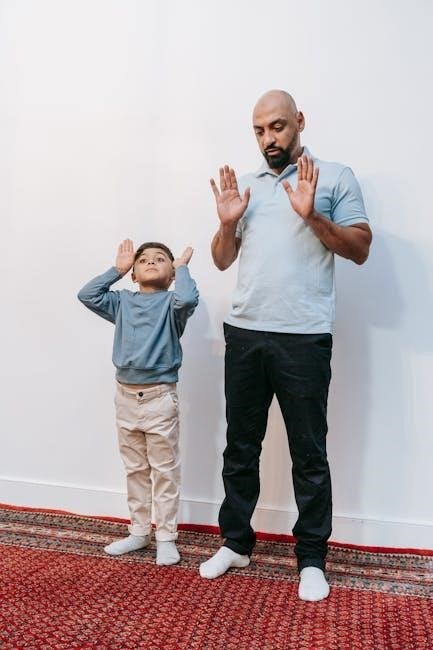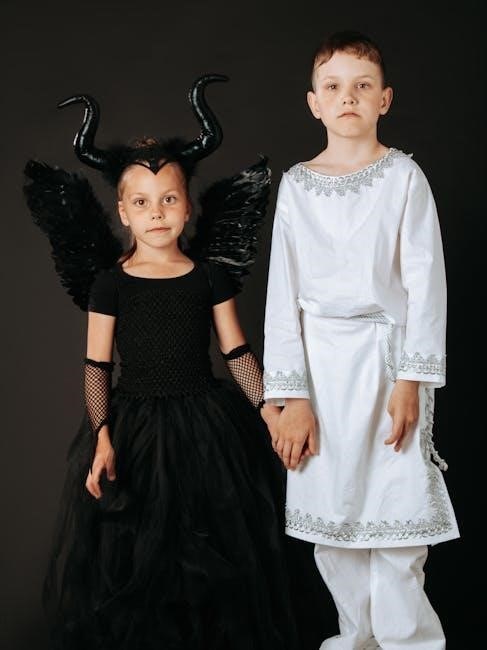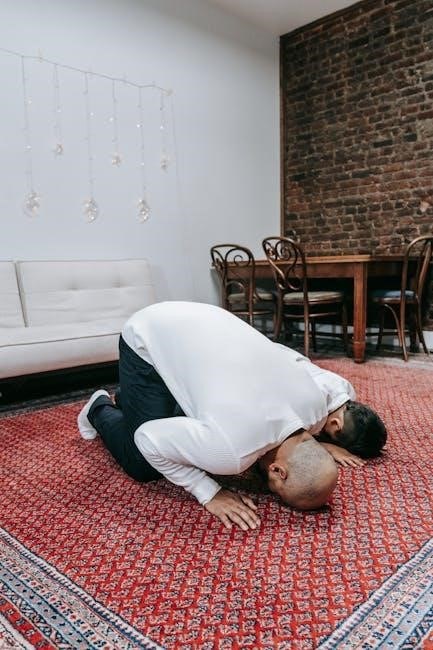family roles list pdf
Family roles are essential for maintaining structure and harmony within a household. They define responsibilities, foster unity, and establish expectations among members. Understanding these roles is crucial for building a balanced and supportive environment, as they influence relationships and overall family dynamics. Common roles include caregivers, providers, mediators, and supporters, each contributing to the well-being of the family system.
1.1. Definition of Family Roles
Family roles refer to the patterns of behavior and responsibilities assigned to or assumed by individuals within a family system. These roles are shaped by cultural, social, and personal expectations, defining how members interact and contribute to the household. They can be formal or informal, varying across families and evolving over time. Common roles include caregivers, providers, mediators, and supporters, each playing a vital part in maintaining balance and harmony. Understanding these roles is essential for fostering a cohesive and functional family environment.
1.2. Importance of Understanding Family Roles
Understanding family roles is crucial for fostering harmony, improving communication, and addressing potential dysfunctions. Recognizing these roles helps individuals identify their responsibilities and contributions, promoting a sense of belonging and unity. It also allows families to address imbalances or harmful patterns, such as codependency or scapegoating, which can hinder personal growth. By understanding their roles, families can create a more supportive and balanced environment, ultimately benefiting both individuals and society by fostering stability and emotional well-being.
1.3. Common Roles in the Family
Common family roles include caregivers, providers, mediators, and supporters. The caregiver nurtures and supports family members, ensuring their well-being. The provider secures resources, maintaining stability. The mediator resolves conflicts, fostering harmony. The supporter offers emotional strength, enhancing resilience. These roles often overlap, with members adapting to diverse situations. Recognizing these roles helps families maintain balance and address challenges effectively, ensuring a cohesive and functional family system.

The Importance of Family Roles
Family roles are vital, ensuring the well-being of members through support, protection, and care. They foster unity, shared experiences, and provide structure for societal stability and individual growth.
2.1. Support, Protection, and Care
Family roles provide essential support, protection, and care, ensuring members feel secure and valued. These roles often involve emotional and practical assistance, fostering resilience and stability. Caregivers, such as parents, offer nurturing, while providers supply resources for well-being. This mutual support system strengthens bonds and helps individuals navigate life’s challenges effectively. By fulfilling these roles, families create a protective environment that promotes physical, emotional, and mental health for all members, contributing to overall happiness and harmony within the household.
2.2. Belonging and Shared Experiences
Family roles foster a sense of belonging by creating shared experiences and emotional connections. These shared moments strengthen bonds, providing a foundation for trust and unity. Roles within the family often involve participating in traditions, activities, and decision-making, which reinforce a collective identity. Shared experiences, such as mealtimes or celebrations, create lasting memories and deepen relationships. This sense of belonging enhances emotional well-being, as family members feel valued and connected. Ultimately, shared experiences and roles contribute to a cohesive family environment where individuals feel secure and supported.
2.3. Structure and Stability for Society
Family roles provide the foundation for societal structure and stability by teaching individuals responsibilities, values, and cooperation. Healthy family dynamics foster interdependence, preparing members to contribute positively to society. Functional roles promote balance, enabling families to support one another and their communities. Conversely, dysfunctional roles can disrupt societal harmony. Strong family structures guide individuals in understanding their roles, fostering a sense of duty and respect for social norms. By nurturing responsibility and unity, families become the cornerstone of a stable and cohesive society, shaping future generations to thrive collectively.

Types of Family Roles
Family roles vary, including caregivers, providers, peacemakers, and parentified children, each fulfilling unique functions. These roles shape interactions, responsibilities, and family dynamics, ensuring stability and harmony.
3.1. The Caregiver or Nurturer
The caregiver, often a parent or guardian, provides emotional and physical support, ensuring the well-being of family members. This role involves nurturing, comforting, and creating a safe environment. Caregivers foster resilience and closeness, addressing needs with empathy and patience. Their dedication strengthens family bonds and promotes harmony, making them integral to the family’s stability and happiness. This role is vital for emotional growth and fostering a supportive home atmosphere.
3.2. The Provider or Breadwinner
The provider, often seen as the breadwinner, ensures financial stability and security for the family. This role involves managing resources, meeting essential needs, and planning for the future. Providers contribute to the family’s quality of life, enabling members to thrive. While traditionally associated with one person, this role can be shared, adapting to modern family structures. Their efforts create a foundation for comfort and opportunities, highlighting their crucial impact on the family’s well-being and long-term goals.
3.3. The Peacemaker or Mediator
The peacemaker or mediator plays a vital role in resolving conflicts and maintaining harmony within the family. This role involves listening to concerns, fostering understanding, and finding solutions that satisfy all parties. Mediators often remain neutral, ensuring fairness and encouraging open communication. Their ability to diffuse tension and promote unity strengthens family bonds. By addressing issues constructively, they help create a supportive environment where members feel heard and valued.
3.4. The Parentified Child
The parentified child takes on responsibilities typically reserved for adults, often caring for younger siblings or managing household tasks. This role reversal can stem from parental absence or dysfunction. While it fosters responsibility, it may hinder the child’s emotional and social development. The parentified child often sacrifices their own needs, leading to long-term effects on personal growth and relationships. Recognizing this role is crucial for addressing imbalances and ensuring the child receives adequate support and care.

Responsibilities of Family Members
Family members share responsibilities, with parents often providing and nurturing, children contributing through chores and behavior, and extended family offering support and guidance collectively.
4.1. Roles of Parents (Mother and Father)
Parents play a vital role in providing emotional, financial, and physical support to their children. Mothers often take on nurturing roles, ensuring daily needs are met, while fathers typically focus on providing stability and guidance. Both parents contribute to creating a safe, loving environment that fosters growth and development. Their responsibilities include setting boundaries, modeling values, and encouraging independence, ensuring their children thrive emotionally and socially; Together, they form the foundation of a balanced and supportive family structure.
4.2. Roles of Children and Siblings
Children and siblings play integral roles within the family, contributing to its dynamic and harmony. They learn values, responsibilities, and social skills through their interactions. Older siblings often take on mentorship roles, while younger ones may seek guidance. Shared experiences strengthen bonds, fostering mutual support and understanding. Children also bring energy and joy, enriching family life. As they grow, they develop individual identities while remaining connected, creating a balanced and nurturing environment for all members to thrive.
4.3. Roles of Grandparents and Extended Family
Grandparents and extended family members play vital roles in strengthening family bonds and providing emotional support. They often serve as wisdom keepers, sharing life experiences and cultural values. Grandparents may act as caretakers, offering childcare and guidance, while also being a source of comfort and love. Extended family members, such as aunts, uncles, and cousins, contribute to shared responsibilities and create a sense of belonging. Their involvement fosters resilience, helps preserve traditions, and provides diverse perspectives, enriching the family system and ensuring its stability across generations.

Dynamics of Family Roles
Family roles create a web of interdependence, balancing responsibilities and emotions. Functional dynamics foster harmony, while dysfunctional patterns may lead to discord, enabling behaviors, and codependency.
5.1. Interdependence in Functional Families
In functional families, roles are interdependent, creating a harmonious balance. Each member’s responsibilities support the others, fostering cooperation and emotional stability. This mutual reliance enhances problem-solving and shared goals, ensuring everyone feels valued. Healthy communication and respect for each role maintain unity, allowing the family to adapt to challenges effectively. Interdependence strengthens bonds, promoting a supportive environment where each member thrives.
5.2. Dysfunctional Family Dynamics
Dysfunctional family dynamics often involve conflicting roles that disrupt harmony. Instead of supporting each other, members may enable harmful behaviors or create tension. Roles like the scapegoat, hero, or enabler can lead to codependency and emotional strain. These dynamics often stem from unresolved issues or imbalanced responsibilities, causing stress and instability. Over time, such patterns can hinder personal growth and create lasting emotional challenges for individuals within the family system. Addressing these issues requires recognition and a collective effort to redefine roles and improve communication.
5.3. Codependency and Enabling Behaviors
Codependency and enabling behaviors often arise in dysfunctional families, where members prioritize others’ needs over their own. This can create an unhealthy cycle of dependency, hindering personal growth. Enabling behaviors, such as covering up mistakes or excusing harmful actions, prevent individuals from facing consequences. Codependency fosters an imbalanced relationship, where one person relies excessively on another for emotional validation. These patterns can lead to resentment and reinforce negative behaviors, making it challenging to break free and establish a healthier family dynamic. Addressing these behaviors is essential for fostering independence and mutual respect.

Common Dysfunctional Family Roles
Common dysfunctional family roles include the scapegoat, hero, mascot, enabler, and lost child. These roles often lead to imbalanced family dynamics and emotional challenges.
6.1. The Scapegoat or Black Sheep
The scapegoat, often labeled as the “black sheep,” is unfairly blamed for family problems. This role typically emerges in dysfunctional families, where one member absorbs criticism or guilt for others’ actions. The scapegoat may feel alienated, developing low self-esteem or rebellious behaviors as a coping mechanism. This role can lead to emotional distress and strained relationships within the family. It often reflects deeper issues within the family dynamic, where accountability is avoided, and stress is misdirected onto one individual.
6.2. The Hero or Golden Child
The hero, often called the “golden child,” is perceived as perfect and responsible. This role typically involves high achievements and setting a positive example for others. The hero may take on excessive family responsibilities, becoming a role model. While this role can foster confidence, it often comes with pressure to maintain an ideal image. Over time, the hero may feel burdened by expectations, leading to stress or resentment. This dynamic can hinder personal growth and create unrealistic standards for others in the family system to follow.
6.3. The Mascot or Clown
The mascot or clown is the family member who uses humor or light-hearted behavior to divert attention from conflicts. This role often involves making others laugh to ease tension or avoid serious discussions. While this can bring temporary relief, it may prevent the family from addressing underlying issues. The mascot may feel pressured to always “keep things light,” which can mask their own emotional struggles. Over time, this role can lead to feelings of isolation, as the mascot’s true feelings remain hidden behind their humorous facade.
6.4. The Lost Child or Rebel
The lost child or rebel often feels disconnected from the family, seeking independence and autonomy. This role involves distancing oneself emotionally or physically, sometimes engaging in rebellious behavior to assert individuality. The lost child may feel misunderstood or overlooked, leading to resentment or withdrawal. Rebellion can manifest as defiance of family rules or societal norms, creating tension within the household. This role often stems from a need to break free from stifling dynamics, but it can also lead to strained relationships and feelings of isolation.
6.5. The Enabler or Caretaker
The enabler or caretaker often takes on the role of supporting or rescuing other family members, sometimes enabling dysfunctional behaviors. This role involves prioritizing others’ needs over their own, which can lead to emotional strain. Enablers may mediate conflicts or cover up issues to maintain peace, inadvertently perpetuating harmful patterns. While their intentions are often good, this role can prevent individuals from taking responsibility for their actions, fostering dependency and hindering healthy growth within the family system.
6.6. The Identified Patient
The Identified Patient is often the family member who exhibits the most noticeable symptoms of the family’s dysfunction. This role is usually assigned to distract from the broader family dynamics. The individual may feel isolated as their behavior is highlighted while others’ issues are overlooked. This can lead to emotional strain and prevent the family from addressing underlying problems. Over time, this role can perpetuate a cycle of dysfunction, making it difficult for the individual to seek help or for the family to heal collectively.

The Impact of Family Roles on Individuals
Family roles deeply influence personal growth, shaping behavior, emotions, and relationships. They can foster resilience or create challenges, impacting self-esteem and long-term development. Understanding these dynamics is key to fostering healthier, more balanced family interactions and individual well-being.
7.1. Positive Aspects of Family Roles
Family roles provide a sense of belonging and shared purpose, fostering emotional and social development. They offer structure, stability, and clarity, helping individuals thrive. Positive roles promote resilience, teaching responsibility, empathy, and conflict resolution. They encourage mutual support, strengthening relationships and creating lasting bonds. Healthy family roles also nurture personal growth, allowing individuals to develop their identities and contribute meaningfully to the family system. This harmonious interplay enhances overall well-being and fosters a supportive, loving environment.
7.2. Negative Aspects of Family Roles
Family roles can sometimes lead to emotional strain, enabling behaviors, and unresolved conflicts. Dysfunctional roles, such as the scapegoat or enabler, may foster codependency and prevent healthy personal growth. These roles can create stress, limit individual potential, and lead to long-term emotional challenges. Additionally, rigid or unbalanced roles may prevent family members from developing accountability and self-awareness, hindering their ability to thrive independently. Over time, these negative dynamics can impact not only personal development but also the overall well-being of the family and its contribution to society.
7.3. Long-Term Effects on Personal Development
Family roles significantly influence personal development, shaping self-perception and future relationships. Dysfunctional roles, such as the scapegoat or enabler, can lead to low self-esteem, emotional struggles, or difficulty in setting boundaries. Conversely, positive roles like the caregiver or peacemaker may foster empathy and responsibility. Over time, these roles can either empower individuals or limit their potential, affecting their ability to form healthy relationships and achieve personal growth. Understanding these long-term effects is crucial for addressing and overcoming challenges rooted in early family dynamics.

Addressing Dysfunctional Family Roles
Addressing dysfunctional family roles involves recognizing harmful patterns and implementing strategies to foster balance. Therapy and open communication are key in creating a supportive environment.
8.1; Recognizing Dysfunctional Patterns
Recognizing dysfunctional patterns in family roles is the first step toward change. These patterns often manifest as unhealthy behaviors such as enabling, codependency, or scapegoating. Family members may unconsciously adopt roles like the hero, mascot, or lost child, perpetuating imbalance. Identifying these roles and their negative impacts is crucial for addressing underlying issues. Open communication and self-reflection help families acknowledge these dynamics, paving the way for constructive change and healthier relationships.
8.2. Strategies for Creating a Balanced Family Environment
Creating a balanced family environment requires intentional strategies. Open communication and active listening are foundational, fostering mutual understanding. Setting clear boundaries and encouraging emotional expression help prevent role conflicts. Assigning responsibilities fairly ensures shared accountability, reducing stress. Promoting empathy and respect among members supports positive interactions. Seeking therapy or counseling can address deep-seated issues, while fostering shared activities strengthens bonds. By prioritizing these practices, families can cultivate harmony and support, allowing each member to thrive in their roles.
8.3. The Role of Therapy and Counseling
Therapy and counseling play a vital role in addressing dysfunctional family roles. Trained professionals help families recognize unhealthy patterns and reevaluate their roles. Through guided sessions, members gain insight into how their behaviors impact others. Therapy fosters open communication, encouraging emotional expression and conflict resolution. It also teaches strategies for adopting healthier roles and improving interdependence. By addressing root issues, counseling empowers families to create a more balanced and supportive environment, promoting long-term emotional well-being for all members.
Family roles are essential for structure and harmony, shaping interactions and responsibilities. They influence personal growth and societal stability, requiring balance to foster positive outcomes for all members.
9.1. Summary of Key Points
Family roles are crucial for maintaining structure and harmony within households. They define responsibilities, influence interactions, and shape individual development. Common roles include caregivers, providers, and mediators, each contributing to the family’s well-being. Understanding these roles helps recognize dysfunctional patterns and promotes positive change. Recognizing these dynamics fosters a balanced family environment, encouraging personal growth and societal stability. The impact of family roles extends beyond the home, influencing long-term development and relationships. A balanced approach ensures roles evolve to meet changing needs, fostering resilience and unity.
9.2. The Future of Family Roles in Society
Family roles are expected to evolve as societal norms and expectations change. With increasing diversity in family structures, roles will adapt to encompass non-traditional arrangements like blended families and same-sex parents. Gender roles may become less rigid, fostering equality in responsibilities. Education and communication will play pivotal roles in promoting balanced family dynamics. As families adapt to modern challenges, their roles will continue to provide stability and support, shaping a more inclusive and resilient society for future generations.
